
Madani Muzakarah
March, April, & May 2024 – Ramadan, Shawwāl, & Dhū al-Qaʿdah
Effect of the name Ḥamzah
Q. It is said children named Ḥamzah are tempestuous and quick to anger. Is there any truth to this?
A. When asking such questions, it is not befitting to do so by mentioning a respectable name. But yes indeed, names do have an effect. As for the name mentioned in the question, it is associated with the Prophet’s uncle who was also a Companion رَضِىَ اللهُ عَـنْهُ; hence, its impact is positive, not negative.
If someone is boisterous, quarrelsome, or short-tempered, this is not because of being named Ḥamzah. Keep this name to draw blessings from its connection to a Companion رَضِىَ اللهُ عَـنْهُ.
Ḥamzah itself means “lion.” Many people who love the Companions and Ahl al-Bayt رَضِیَ اللهُ عَنْهُم are named this. اَلْـحَمْـدُ لـِلّٰـه The issue mentioned in the question is not something that I have ever seen to be the case.[1]
Veiling before one’s uncles-in-law and their children
Q. Is a woman required to veil herself before her paternal or maternal uncles-in-law (i.e. her husband’s paternal or maternal uncle) and their children?
A. Yes, a woman is required to observe a veil before her paternal and maternal uncles-in-law and their children. Veiling is to be observed before someone whom it is not perpetually haram to marry; such a person is referred to as a non-maḥram and stranger.[2]
Not reciting the supplication (duꜤāˈ) for the deceased in funeral prayer
Q. Is the funeral prayer valid if the supplication specified for the deceased is not recited?
A. The funeral prayer is still valid if the supplication for the deceased is not recited. Anyone who does not know the supplication should either recite the duꜤāˈ māthūrah:
اَللّٰہُمَّ رَبَّنَاۤ اٰتِنَا فِی الدُّنْیَا حَسَنَةً وَّ فِی الْاٰخِرَةِ حَسَنَةً وَّ قِنَا عَذَابَ النَّارِ
or
ii) رَبِّ اغْفِرْلِیْ (x3).
Sūrat al-Fātiḥah can also be recited with the intention of it being a supplication; acting upon the sunnah will be fulfilled, although one should memorise the supplication for the funeral prayer.[3]
Even the smallest of troubles carry reward for a Muslim
Q. Will someone who has had their limbs amputated attain any virtue or reward?
A. Yes. A Muslim’s sins are expiated even if they are pricked by a thorn. The Prophet صَلَّى اللهُ عَلَيْهِ وَاٰلِهٖ وَسَلَّم said, “No hardship, illness, sorrow, sadness, pain, or distress afflicts a Muslim—not even the pricking of a thorn—except Allah makes that an expiation for his sins.”[4]
Ruling on facing someone praying behind a glass partition
Q. If someone looks at another person offering salah behind a glass partition, will it be said that the person looking has his face towards the one praying?
A. No, it will not be said that the person looking has his face towards the one praying. This is because there is an obstacle between the two. There is no issue in facing towards the person that is praying.[5]
Reciting more than one surah in one unit (rakꜤah) of a sunnah prayer
Q. Can more than one surah be recited after Surat al-Fātiḥah in one unit of a sunnah prayer?
A. Yes, this is permitted.[6]
Sleep in Paradise
Q. Will there be sleep in Paradise?
A. No, there will not.[7]
Ruling on women crying out loud
Q. How is it for a woman to cry out loud in remembrance of the Prophet صَلَّى اللهُ عَلَيْهِ وَاٰلِهٖ وَسَلَّم, or when remembering Madinah?
A. There is no issue in her crying out loud, if the sound of her crying does not reach any non-maḥram.[8]
Requesting someone ill to supplicate
Q. How is it to request someone ill to pray for you?
A. This is a commendable act. A hadith states, “Request an ill person to make duꜤāˈ, for his duꜤāˈ is like that of the angels.”[9]
The place of Resurrection
Q. Where will the Resurrection take place?
A. In Syria.[10]
Ruling on leaving out thanāˈ
Q. Is it necessary to offer sujūd al-sahw if one forgets to recite thanāˈ?
A. No, because it is sunnah to recite thanāˈ, and missing out a sunnah does not necessitate sujūd al-sahw. However, one should not intentionally leave out thanāˈ.[11]
Marrying in the month of Dhu al-Qaʿdah
Q. Is it permissible to get married in the month of Dhū al-Qaʿdah?
A. Yes, it is permissible.[12]
Wiping long hair during wudu
Q. Can those with long hair wipe them during wudu without removing their turban?
A. On page 291 of Bahār-i Sharīʿat’s first volume, it states, “Wiping the hairs that hang from the head will not fulfil the requirement of wiping.”[13]
[1] Madani Muzakarah, 16th Shawwāl 1444 AH
[2] Madani Muzakarah, after tarāwīḥ, 7th Ramadan 1444 AH
[3] Bahār-i-Sharīʿat, vol. 1, pp, 829, 835; Madani Muzakarah , 9th Shawwāl 1444 AH
[4] Saḥīḥ Bukhārī, vol. 4, p. 3, Hadith 5641; Madani Muzakarah, 23rd Shawwāl 1444 AH
[5] Madani Muzakarah, 23rd Shawwāl, 1444 AH
[6] Fatāwā Amjadiyya, vol. 1, pp. 97-98; Madani Muzakarah, 16th Shawwāl 1444 AH
[7] Muʿjam Awsaṭ, vol. 1, p. 266, Hadith 919; Madani Muzakarah, 23rd Ramadan 1444 AH
[8] Madani Muzakarah, 30th Shawwāl, 1444 AH
[9] Sunan Ibn Mājah, vol. 2, p. 191; Madani Muzakarah, 30th Shawwāl, 1444 AH
[10] Musnad Imam Aḥmad, vol. 7, pp. 235-237, Hadith 20042-20051; Madani Muzakarah, 30th Shawwāl 1444 AH
[11] Madani Muzakarah, 7th Dhū al-Qaʿdah 1444 AH
[12] Fatāwā Riḍawiyyah, vol. 11, p. 265; Madani Muzakarah, 16th Shawwāl 1444 AH
[13] Madani Muzakarah, 13th Rabīʿ al-Ākhir 1444 AH

















Comments